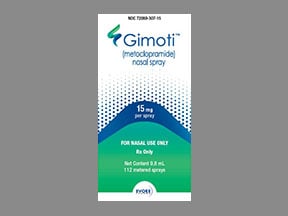
Gimoti Coupons & Savings Card – Discount Prices from $2603.10
My prescription
Edit
9.8ML of 15MG/ACT, Gimoti (1 Spray Btl)
Select pharmacy

CVS
$2603.10
COUPON PRICE
Walmart
$2628.95
COUPON PRICE
Walgreens
$2639.94
COUPON PRICE
Albertsons
$2640.13
COUPON PRICEGimoti savings card
Show this card to your pharmacist
CVS
$2603.10
BIN
ID
PCN
GRP
019876
LHAB1EABB6
CHIPPO
LHX
Powered by
Related dopamine receptor antagonists prescriptions
More prescriptions for nausea
Related dopamine receptor antagonists prescriptions
More prescriptions for nausea
Price history for Gimoti
1 Spray Btl, 9.8ML of 15MG/ACT
Average retail price for Gimoti
Average SaveHealth price for Gimoti
Our price history data is based on aggregated prescription data collected from participating pharmacies in America. Our prescription data updates daily to reflect the latest price changes. If you notice a missing data point, it means there wasn't sufficient data available to generate a monetary value for that date.
*Retail prices are based on pharmacy claims data, and may not be accurate when we don't have enough claims.
Gimoti dosage forms
Dosage Quantity Price from Per unit 9.8ML of 15MG/ACT 1 Spray Btl $2603.10 $2603.10 9.8ML of 15MG/ACT 2 Spray Btls $5187.90 $2593.95 9.8ML of 15MG/ACT 3 Spray Btls $7772.70 $2590.90
| Dosage | Quantity | Price from | Per unit |
|---|---|---|---|
| 9.8ML of 15MG/ACT | 1 Spray Btl | $2603.10 | $2603.10 |
| 9.8ML of 15MG/ACT | 2 Spray Btls | $5187.90 | $2593.95 |
| 9.8ML of 15MG/ACT | 3 Spray Btls | $7772.70 | $2590.90 |
What is the drug Gimoti used for?
Gimoti is used to treat symptoms of gastroparesis in adults. Gastroparesis is a condition where the stomach takes too long to empty its contents, leading to symptoms such as nausea, vomiting, and stomach discomfort. Gimoti helps by increasing the movements or contractions of the stomach and intestines, which aids in the digestion process.
Is gimoti a specialty drug?
Yes, Gimoti is considered a specialty drug. It is a nasal spray formulation of metoclopramide used for the treatment of symptoms associated with acute and recurrent diabetic gastroparesis in adults. Specialty drugs often require special handling, administration, or monitoring, and are typically used to treat complex or chronic conditions.
Does gimoti cause weight gain?
Gimoti, which contains metoclopramide, does not typically list weight gain as a common side effect. However, individual reactions to medications can vary. If there are concerns about weight changes while using Gimoti, it is advisable to consult a healthcare provider for personalized advice.
What does gimoti do?
Gimoti is a nasal spray formulation of metoclopramide. It is used to treat symptoms of acute and recurrent diabetic gastroparesis in adults. This condition involves delayed stomach emptying, and Gimoti helps by enhancing gastric motility, thereby alleviating symptoms such as nausea, vomiting, and abdominal discomfort.
How much does Gimoti cost?
The cost of Gimoti can vary depending on factors such as the pharmacy, location, and whether the patient has insurance coverage. Without insurance, the price can be higher, but with insurance or discount programs, the cost may be reduced. It is advisable for the patient to check with local pharmacies or their insurance provider for the most accurate and up-to-date pricing information.
